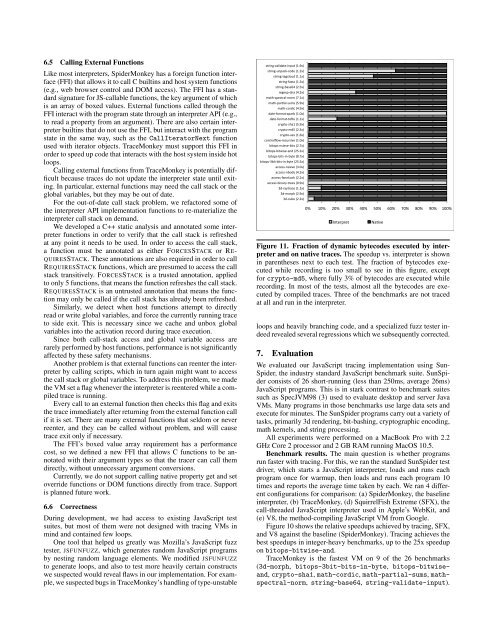compressed.tracemonkey-pldi-09
Create successful ePaper yourself
Turn your PDF publications into a flip-book with our unique Google optimized e-Paper software.
6.5 Calling External Functions<br />
Like most interpreters, SpiderMonkey has a foreign function interface<br />
(FFI) that allows it to call C builtins and host system functions<br />
(e.g., web browser control and DOM access). The FFI has a standard<br />
signature for JS-callable functions, the key argument of which<br />
is an array of boxed values. External functions called through the<br />
FFI interact with the program state through an interpreter API (e.g.,<br />
to read a property from an argument). There are also certain interpreter<br />
builtins that do not use the FFI, but interact with the program<br />
state in the same way, such as the CallIteratorNext function<br />
used with iterator objects. TraceMonkey must support this FFI in<br />
order to speed up code that interacts with the host system inside hot<br />
loops.<br />
Calling external functions from TraceMonkey is potentially difficult<br />
because traces do not update the interpreter state until exiting.<br />
In particular, external functions may need the call stack or the<br />
global variables, but they may be out of date.<br />
For the out-of-date call stack problem, we refactored some of<br />
the interpreter API implementation functions to re-materialize the<br />
interpreter call stack on demand.<br />
We developed a C++ static analysis and annotated some interpreter<br />
functions in order to verify that the call stack is refreshed<br />
at any point it needs to be used. In order to access the call stack,<br />
a function must be annotated as either FORCESSTACK or RE-<br />
QUIRESSTACK. These annotations are also required in order to call<br />
REQUIRESSTACK functions, which are presumed to access the call<br />
stack transitively. FORCESSTACK is a trusted annotation, applied<br />
to only 5 functions, that means the function refreshes the call stack.<br />
REQUIRESSTACK is an untrusted annotation that means the function<br />
may only be called if the call stack has already been refreshed.<br />
Similarly, we detect when host functions attempt to directly<br />
read or write global variables, and force the currently running trace<br />
to side exit. This is necessary since we cache and unbox global<br />
variables into the activation record during trace execution.<br />
Since both call-stack access and global variable access are<br />
rarely performed by host functions, performance is not significantly<br />
affected by these safety mechanisms.<br />
Another problem is that external functions can reenter the interpreter<br />
by calling scripts, which in turn again might want to access<br />
the call stack or global variables. To address this problem, we made<br />
the VM set a flag whenever the interpreter is reentered while a compiled<br />
trace is running.<br />
Every call to an external function then checks this flag and exits<br />
the trace immediately after returning from the external function call<br />
if it is set. There are many external functions that seldom or never<br />
reenter, and they can be called without problem, and will cause<br />
trace exit only if necessary.<br />
The FFI’s boxed value array requirement has a performance<br />
cost, so we defined a new FFI that allows C functions to be annotated<br />
with their argument types so that the tracer can call them<br />
directly, without unnecessary argument conversions.<br />
Currently, we do not support calling native property get and set<br />
override functions or DOM functions directly from trace. Support<br />
is planned future work.<br />
6.6 Correctness<br />
During development, we had access to existing JavaScript test<br />
suites, but most of them were not designed with tracing VMs in<br />
mind and contained few loops.<br />
One tool that helped us greatly was Mozilla’s JavaScript fuzz<br />
tester, JSFUNFUZZ, which generates random JavaScript programs<br />
by nesting random language elements. We modified JSFUNFUZZ<br />
to generate loops, and also to test more heavily certain constructs<br />
we suspected would reveal flaws in our implementation. For example,<br />
we suspected bugs in TraceMonkey’s handling of type-unstable<br />
?>9@AJ.D#3$4,56#<br />
?>9@AJ.0A:9@AJ.>9@AJ.B9@AJ.1


